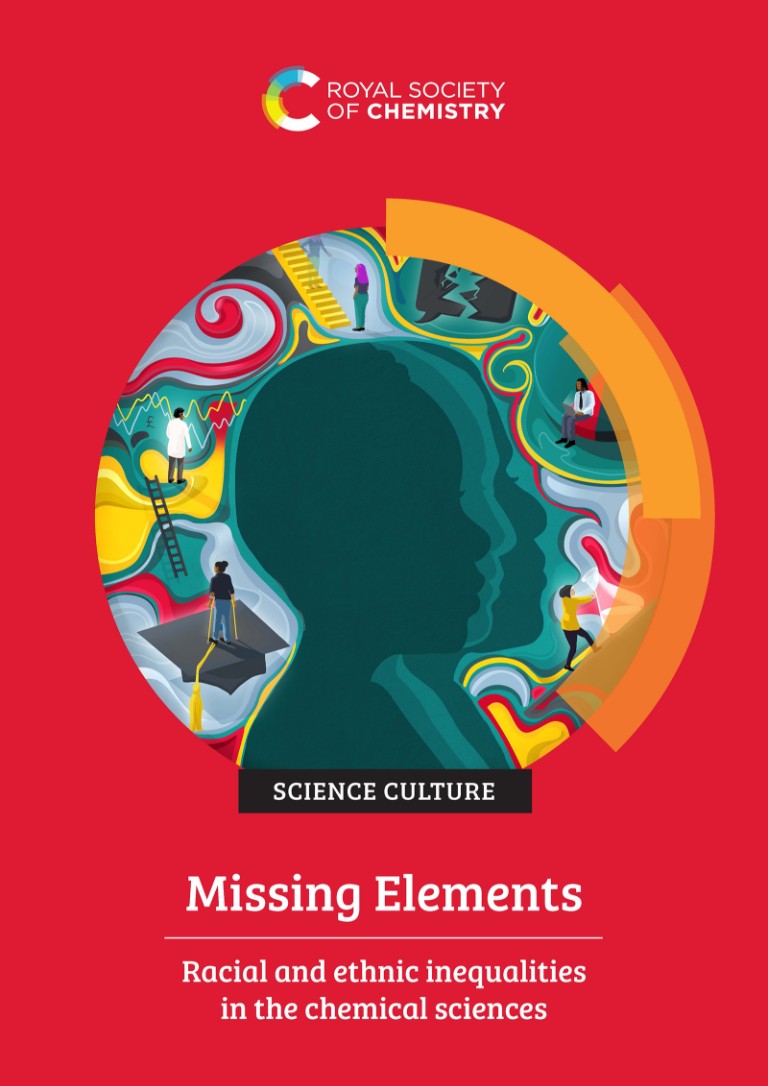Missing elements: racial and ethnic inequalities in the chemical sciences
We need to talk about and address racism, discrimination and inequality in the chemical sciences.
Talented Black chemists leave the profession at every stage of their career path after undergraduate studies. People from Black and minoritised ethnicities are underrepresented at senior levels in industry and academia.
We need to talk about and address racism, discrimination and inequality in the chemical sciences.
On this page
0%
of chemistry professors in UK academia are Black
<1%
of principal investigators (PIs) across all subjects are Black
10% less
average funding award for minority ethnic PIs (£320,000 vs £350,000 for White PIs)
£1.5m
Our initial investment over three years in a dedicated Race and Ethnicity Unit

Our report
Our report is based on lived experiences of Black and minoritised ethnicity scientists.
Missing Elements shines a stark light on racism and ethnic inequalities in the chemical sciences. We reviewed relevant data and reports and gathered new qualitative evidence of chemical scientists’ lived experiences.
Our launch event
Missing elements live launch event. Speakers include RSC CEO Dr Helen Pain, Professor Robert Mokaya, Professor Ijeoma Uchegbu, Kevin Coutinho and Professor Marina Resmini.
Lived experiences
Lived experiences of Black and minoritised ethnicity scientists
Six key themes
Racism and race inequalities exist in the chemical sciences – this is a fact. We reviewed data and spoke to chemists about their lived experiences. This highlighted six key interacting themes that impact retention and progression for Black and minoritised ethnicity chemists:
- Attraction, inspiration and progression. “There is such a lack of role models. The people who are celebrated chemists are White people, I just don’t see people who look like me.”
- Mentorship, sponsorship and networks. “There was no-one more senior than me who was Black. And this can close doors. I never had formal mentoring.”
- The culture of chemistry. “Projects get taken away from you and given to others. It’s assumed you don’t need it – there’s actually a sense that I’ll be alright because I’m the “diversity hire.”
- Funding systems and structural barriers. “The system is broken… from postal reviews to panels. It’s not simple or overt, it’s nuanced and it’s institutionalised.”
- Global community. “We’re interconnected as a world; we need a global perspective and approach. We need to be engaging with organisations outside of the UK to help bring in new role models.”
- Leadership in the community, accountability and allyship. “Many well-intentioned people in these positions of power who could be disposed to help simply have a blind spot – racism and inequality are just not on their radar as issues.”
It’s time to act
The depth of systemic inequalities are beyond any one institution’s capacity to change. Academia and industry; institutions and individuals – we all need to work together to stamp out racism and inequality and create the needed real, lasting and structural change.
With the launch of this report we are committing to:
- Create a dedicated Race & Ethnicity Unit, funded by an initial £1.5 million investment to lead systemic change.
- Partner with chemical industry employers to strengthen career support, opportunities and progression.
- Launch a five-year RSC-Windsor Fellowship mentoring scheme for chemistry students.
- Proactively increase representation in our governance, committees and editorial boards.
- Engage with our community and partners to listen to, share and learn from lived experiences and continually challenge ourselves to do more.
Spread the word
Use our ready-made image packs to share on social media.
Download landscape images (ZIP)
Ideal for sharing on Twitter, Facebook and LinkedIn
Ideal for sharing on Instagram
Disclaimer regarding the language used in this report
The parameters of inclusive language continue to evolve as our learning and understanding of complex matters develops. While we strive to use the most up-to-date terminology when we publish all our documents, we recognise that terms may become outdated as commonly accepted language moves on.
Contact our inclusion team
We're here to help. Get in touch if you have any questions about inclusion in the chemical sciences.